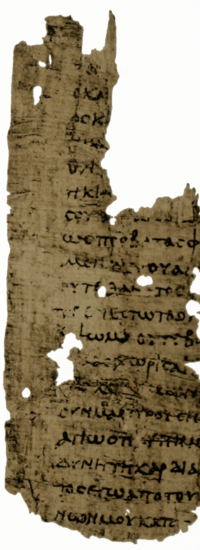Romans 14
Romans 14 is the fourteenth chapter of the Epistle to the Romans in the New Testament of the Christian Bible. It is authored by Paul the Apostle, while he was in Corinth in the mid 50s CE,[1] with the help of an amanuensis (secretary), Tertius, who adds his own greeting in Romans 16:22.[2] Protestant Reformer Martin Luther summarised this chapter as Paul's teaching that "one should carefully guide those with weak conscience and spare them; one shouldn't use Christian freedom to harm, but rather to help, the weak".[3] Lutheran theologian Johann Albrecht Bengel says that Paul "refers all things to faith".[4]
| Romans 14 | |
|---|---|
 Epistle to the Romans 8:12–22 in the bigger of two fragments forming Papyrus 27 (recto side), written in the 3rd century. | |
| Book | Epistle to the Romans |
| Category | Pauline epistles |
| Christian Bible part | New Testament |
| Order in the Christian part | 6 |
Text
The original text was written in Koine Greek. This chapter is divided into 23 verses.
Textual witnesses
Some early manuscripts containing the text of this chapter are:
- In Greek:
- Codex Vaticanus (AD 325–350)
- Codex Sinaiticus (330–360)
- Codex Alexandrinus (400–440)
- Codex Ephraemi Rescriptus (~450; complete)
- In Gothic language
- Codex Carolinus (6th/7th century; extant verses 9–20)
- In Latin
- Codex Carolinus (6th/7th century; extant verses 9–20)
Old Testament references
The weak in faith
The word which Paul uses for "weakness" in faith (Greek: τον ... ἀσθενοῦντα τῇ πίστει, ton asthenounta tē pistei) refers to both physical illness and moral weakness.[5] In 2 Timothy 4:20, Paul says that his missionary companion Trophimus was sick (Greek: ἀσθενοῦντα, asthenounta) when [he] left him at Miletus.
Verse 4
- Who are you to judge another’s servant? To his own master he stands or falls. Indeed, he will be made to stand, for God is able to make him stand.[6]
Verse 13
- Therefore let us not judge one another anymore, but rather resolve this, not to put a stumbling block or a cause to fall in our brother’s way.[7]
Verse 23
- But he who doubts is condemned if he eats, because he does not eat from faith; for whatever is not from faith is sin.[8]
References
- Hill 2007, p. 1084.
- Donaldson, Terence L. (2007). "63. Introduction to the Pauline Corpus". In Barton, John; Muddiman, John (eds.). The Oxford Bible Commentary (first (paperback) ed.). Oxford University Press. p. 1077. ISBN 978-0199277186.
- Luther, M., Preface to the Letter of St. Paul to the Romans, translated by Andrew Thornton, OSB
- Bengel's Gnomon of the New Testament on Romans 14, accessed 2 October 2016
- Strong's Concordance 770: astheneó
- Romans 14:4
- Romans 14:13
- Romans 14:23
Bibliography
- Coogan, Michael David (2007). Coogan, Michael David; Brettler, Marc Zvi; Newsom, Carol Ann; Perkins, Pheme (eds.). The New Oxford Annotated Bible with the Apocryphal/Deuterocanonical Books: New Revised Standard Version, Issue 48 (Augmented 3rd ed.). Oxford University Press. ISBN 9780195288810.
- Hill, Craig C. (2007). "64. Romans". In Barton, John; Muddiman, John (eds.). The Oxford Bible Commentary (first (paperback) ed.). Oxford University Press. pp. 1083–1108. ISBN 978-0199277186. Retrieved February 6, 2019.
External links
- Romans 14 King James Bible - Wikisource
- English Translation with Parallel Latin Vulgate
- Online Bible at GospelHall.org (ESV, KJV, Darby, American Standard Version, Bible in Basic English)
- Multiple bible versions at Bible Gateway (NKJV, NIV, NRSV etc.)